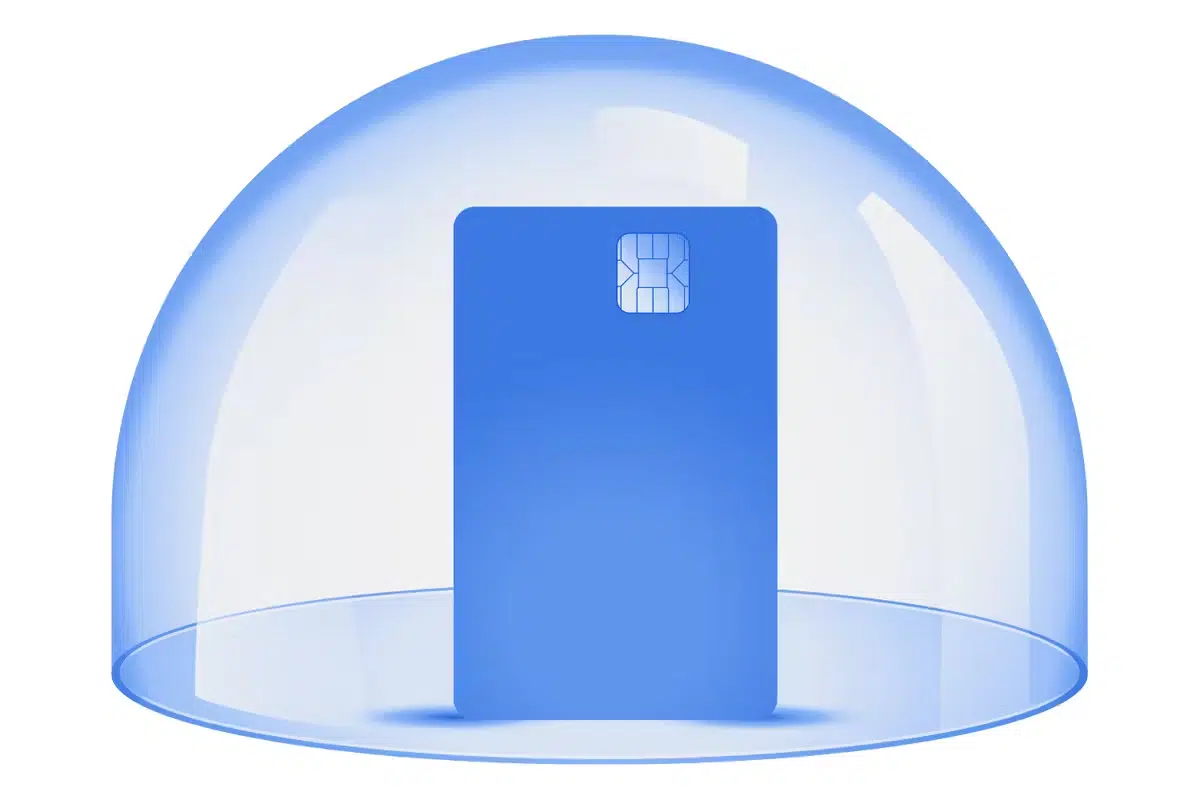
Protect Your Debit Card

In today’s digital world, protecting your debit card is more important than ever. From online shopping to contactless payments, debit cards are a convenient and secure way to pay for goods and services. But with convenience comes responsibility. As a debit card user, it’s important that you take steps to keep your information safe from fraud and identity theft. Here are some tips for protecting your debit card.
1. Memorize Your Debit Card Number and Expiration Date
It’s important to memorize both your card number and expiration date so that you can quickly provide the information if needed. Also, be sure not to write down this information anywhere, as it could put you at risk of identity theft if it were to fall into the wrong hands.
Leave Your Bank Fees Behind
No account fees. No overdraft fees. No bank fees at all.
2. Choose Strong PINs and Passwords
When creating a PIN and / or password to protect your debit card, it’s important to choose one that is unique and difficult to guess.
- Avoid using sequences of numbers in your PIN or password, for example: “1234” or “ABCD”.
- Never use your address or birthdate as your PIN or in your password
- A strong password should include a combination of numbers, special characters, upper- and lower-case letters
- Never share your PIN or password with anyone else.
3. Monitor Your Bank Account Activity
It is important to check your account balance and transactions regularly so that you can spot any suspicious activity right away. If you notice anything unusual on your statement – such as charges from merchants that you didn’t recognize – contact the bank or credit union immediately so they can investigate further on your behalf.
The advantage here is speed. When you notify your financial institution or shut the card down via card controls quickly, you limit the amount of fraud that can take place–which drastically reduces the time and effort needed to fix your account.
Banking apps allow you to check your balance at any time and view recent transactions so that you can ensure there are no unauthorized charges on your account. You should also review monthly statements for accuracy and discrepancies.
4. Set Up Card Controls to Manage Your Debit Card
Controlling your card via app or within online banking is a fantastic way to help protect your debit card–both from fraud and from your own spending habits! If your card has been lost or stolen, card controls make it easy to immediately lock your card and prevent any further fraud from happening. Here are some other ways that card controls can help:
- Limit transactions
- Identify recurring subscriptions
- Set up travel notices
- Customize alerts or controls by location, merchant types, transaction types, and spend limits.
- View every recurring payment on your card within 30 days of most recent transaction
5. Use Virtual Debit Cards
Many financial institutions offer virtual cards which provide an extra layer of security. Virtual cards don’t require the use of actual debit card numbers but instead generate single-use virtual accounts numbers for each transaction. This limits repeat transactions, should the number become compromised in any way by fraudsters or thieves.
6. Use Contactless Payments When Possible
Contactless payments are becoming more popular due to their convenience and security features such as tokenization, which replaces a customer’s sensitive payment data with a randomly generated number each time they make a purchase. Contactless payments like Apple Pay provide an extra layer of security by allowing users to keep their physical cards in their wallet while still making secure purchases online or in-store without needing to enter their card details or PIN each time.
7. Keep Your Physical Debit Card in a Safe Place
Don’t leave your debit card lying around or in plain sight. Instead, keep it in a secure place where it can’t be accessed by others. You should also consider carrying only the cards you need while out and about so as not to draw attention or temptation to thieves or hackers who might try to steal your information.
8. Don’t Share Your Debit Card Number with Anyone You Don’t Trust
When making online purchases, be sure that the website is secure before entering any payment information – look for “https” in the URL address bar and a padlock next to the web address. Additionally, don’t share your debit card number with anyone who you don’t completely trust – even if they say they need it for verification purposes. This might be a friend, family member, business, or online retailer–regardless of how you know them, if you’re not 100% sure you can trust them, don’t reveal your debit card number! The financial risk isn’t worth it.
9. Be Aware of Skimming Devices
ATMs and gas pumps are common targets for criminals who use skimming devices to steal debit card information when users enter their cards into the machines. To help protect yourself from skimming devices, be aware of the ATMs you use and avoid those that appear tampered with or have loose parts attached to them. Additionally, cover up the keypad while entering your PIN in case there are any hidden cameras nearby that might be used to capture it.
10. If You Lose Your Debit Card, Report It Immediately
If you lose your debit card or suspect that someone has stolen it, report it immediately to the bank or credit union so they can cancel the old one and issue a new one right away. This will help prevent fraudulent charges from appearing on your account statement later on down the road.
11. In The Event Of Fraud, Dispute Any Unauthorized Charges Immediately
If you do come across any unauthorized charges on your account statement, contact the bank or credit union immediately so they can investigate further on your behalf and dispute any charges that may have been made without authorization or permission from yourself. The faster you do this, the easier it will be to resolve fraudulent charges and get your account back to where it should be.
What Happens If I Don’t Protect My Debit Card?
If you don’t take the necessary steps to protect your debit card, you could be leaving yourself vulnerable to fraud and identity theft. Fraudsters can use stolen card information to make purchases online or in stores, withdraw money from your account, or even open new accounts under your name. If this were to happen, it could lead to financial losses or even a damaged credit score if the person is attempting to take out loans under your name.
To avoid this, it is important to be proactive in protecting your debit card information. Be sure to keep the physical card somewhere safe and secure; never write down any of your financial information such as your PIN number or debit card number; always check purchase receipts against statements; and only shop at trusted websites when making online purchases. Additionally, utilize a bank’s card controls or alerts feature if available – this can help you set up travel notices and customize alerts for certain transaction types and merchants, so you can ensure that all of your purchases are legitimate.
Finally, should anything unusual occur on your statement – like charges from merchants that you’re unfamiliar with – contact the bank immediately for further investigation. Doing so will ensure that any unauthorized activity can be stopped before any real damage is done.
The Extra Precautions Are Worth It
Safeguarding your debit card is essential in today’s digital world. Taking the extra steps to protect yourself from fraud and identity theft can be a hassle, but it’s worth it when you consider the potential consequences that could arise if someone were to get access to your account information.


